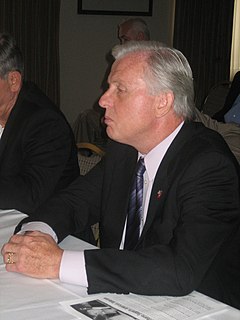
The 1978 United States Senate elections in the middle of Democratic President Jimmy Carter's term. Thirteen seats changed hands between parties. The Democrats at first lost a net of two seats to the Republicans, and then one more in a special election. Democrats nevertheless retained a 58-41 majority.

Jack E. Wagner is a Democratic politician from Pennsylvania. He is a former State Auditor General, and has also served in the State Senate and Pittsburgh City Council.

The 1962 Alabama gubernatorial election took place on November 6, 1962. Incumbent Democrat John Malcolm Patterson was term limited and could not seek a second consecutive term.

The 1970 New York gubernatorial election was held on November 3, 1970 to elect the Governor and Lieutenant Governor of New York. Incumbent Republican Governor Nelson Rockefeller defeated the Democratic nominee, former UN Ambassador and Supreme Court Justice Arthur Goldberg by more than ten percentage points. On January 1, 1971, he was sworn in for his fourth term as governor.

The 1974 Massachusetts gubernatorial election was held on November 5, 1974. Michael Dukakis was elected to a four-year term, from January 4, 1975 until January 4, 1979. He defeated incumbent Governor of Massachusetts Francis W. Sargent in the general election.

The 1970 Massachusetts gubernatorial election was held on November 3, 1970. Acting Governor Francis W. Sargent was elected to a four-year term. He defeated incumbent Boston Mayor Kevin H. White in the general election.

The 1966 Massachusetts gubernatorial election was held on November 8, 1966. Governor John A. Volpe was reelected to a four-year term. He defeated former Attorney General Edward J. McCormack, Jr. in the general election. This was the first election held since Governor's Term of office was extended from two to four years.

The 1964 Massachusetts gubernatorial election was held on November 3, 1964. Former Governor John A. Volpe was elected to a two-year term. He defeated former Lieutenant Governor Francis X. Bellotti in the general election.

The 1962 Massachusetts gubernatorial election was held on November 6, 1962. Former Executive Councilor Endicott Peabody defeated incumbent Governor John A. Volpe in the general election.

The 1984 Indiana gubernatorial election was held on November 6, 1984 in all 92 counties of Indiana. Robert D. Orr, the state's incumbent Republican governor, was comfortably reelected to a second term, defeating State Senator Wayne Townsend and two minor party challengers in the general election. His victory marked the fifth consecutive victory for the Republican Party in Indiana gubernatorial elections, and the last time Republicans would win the governorship in the 20th century.

The 1930 Arizona gubernatorial election took place on November 4, 1930. George W. P. Hunt narrowly won the general election in 1930, defeating incumbent governor John Calhoun Phillips, who had defeated Hunt in his bid for reelection in the previous election year in 1928.

The 1932 Arizona gubernatorial election took place on November 8, 1932. Incumbent Governor George W. P. Hunt ran for the Democratic nomination, but lost in the primary to Benjamin Baker Moeur, whose pre-gubernatorial experience included service as the Secretary of the Board of Education for Arizona State Teacher's College, which would later become Arizona State University.

The 1934 Arizona gubernatorial election took place on November 6, 1934. Incumbent Governor Benjamin Baker Moeur ran for reelection, he was challenged by former governor George W. P. Hunt and future Governor Rawghlie Clement Stanford in the Democratic primary, but he defeated both of them by a comfortable margin.

The 1936 Arizona gubernatorial election took place on November 3, 1936. Incumbent Governor Benjamin Baker Moeur ran for reelection, but he was defeated in the Democratic primary by former judge of the Maricopa County Superior Court Rawghlie Clement Stanford.

The 1938 Arizona gubernatorial election took place on November 8, 1938. Incumbent Governor Rawghlie Clement Stanford declined to run for reelection, with pharmacy and cattle ranch owner Robert Taylor Jones winning the Democratic nomination to succeed Stanford.

The 1942 Arizona gubernatorial election took place on November 3, 1942. Incumbent Governor Sidney Preston Osborn ran for reelection, and easily defeated a challenge from former Governor Robert Taylor Jones in the Democratic primary, who Osborn also defeated in 1940.

The 1944 Arizona gubernatorial election took place on November 7, 1944. Incumbent Governor Sidney Preston Osborn ran for reelection, and easily won the Democratic primary, with only token opposition as former Governor Robert Taylor Jones declined to challenge Osborn to a rematch following two losses, in 1940 and 1942.

The 1952 Arizona gubernatorial election took place on November 4, 1952. Incumbent Governor John Howard Pyle, the first Republican elected to the office in two decades, ran for reelection to a second term.

The 1964 Arizona gubernatorial election took place on November 3, 1964. Incumbent Governor Paul Fannin decided not to run for reelection to a fourth term as governor, instead deciding to successfully run for the United States Senate when incumbent U.S. Senator Barry Goldwater decided to run for President of the United States.

The 1966 Arizona gubernatorial election took place on November 8, 1966. Incumbent Governor Samuel Pearson Goddard ran for reelection to a second term as Governor, narrowly winning the Democratic Party nomination as he was challenged by Justice of the Peace Norman Green.

























